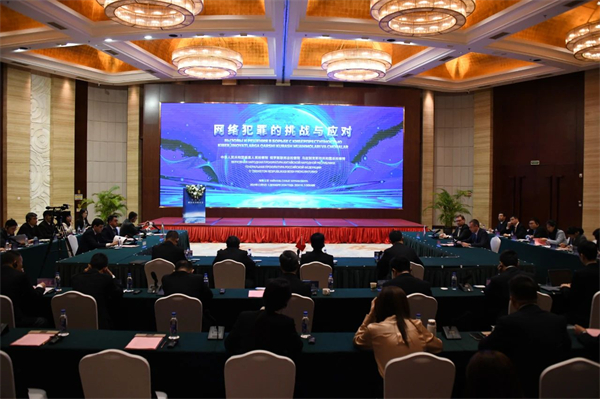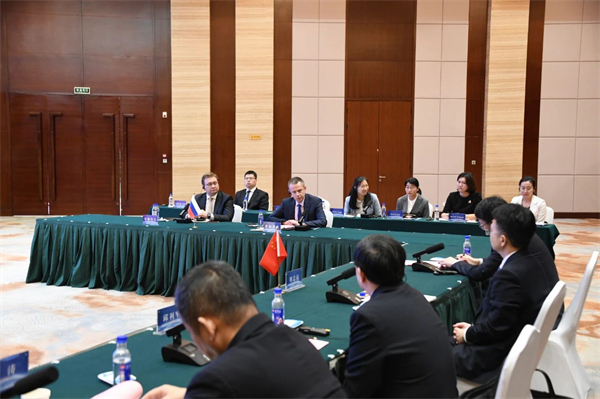A roundtable seminar was held on Dec 5 in Sanya, South China's Hainan province, where more than 30 prosecutors from China, Russia and Uzbekistan got together to discuss the challenges presented by cybercrime and relevant countermeasures.
For China's foreign-related procuratorial work, this event served as a vivid example of strengthening international pragmatic judicial cooperation and as a meaningful attempt to combat cross-border crime.

A seminar for prosecutors from China, Russia and Uzbekistan is held on Dec 5 in Sanya, South China's Hainan province.
Consensus: Cybercrime has become a global challenge
In recent years, under the strategic guidance of President Xi Jinping and the leaders of Russia and Uzbekistan, bilateral relations between China and Russia as well as between China and Uzbekistan have continued to develop at a higher level, with political mutual trust deepened and cooperation in various fields advanced.
In the field of justice, the three countries' procuratorial authorities have engaged in extensive and effective pragmatic cooperation within the framework of the Prosecutor-General Conference Mechanism of the Shanghai Cooperation Organization Member States.
The seminar was held to implement specific measures outlined in the "Cooperation Plan between the Supreme People's Procuratorate of the People's Republic of China and the Prosecutor General's Office of the Russian Federation for 2023-24" and the "Program in Cooperation between the Supreme People's Procuratorate of the People's Republic of China and the Prosecutor General's Office of the Republic of Uzbekistan for the period 2024-2025".
Why did this seminar focus on cybercrime, especially transnational cybercrime?
It is well known that cybercrime has become a global challenge, said Viacheslav Mikheev, Deputy Director General of the General Directorate of International Legal Cooperation and head of the Extradition Department of the Prosecutor General's Office of Russia.
Mikheev gave a rundown of important activities undertaken by Russian procuratorial authorities in collaboration with legislative, administrative and financial departments, telecommunications operators and information technology companies to combat cybercrime. For instance, he mentioned about the anti-fraud software they have developed to identify and prevent serial cybercrimes.
In his speech, Anvarov Komoliddin Habibulla ugli, Senior Prosecutor of the Department of Supervision over the Implementation of Legislation in the Internal Affairs Bodies of the Prosecutor General's Office of Uzbekistan, pointed out that in the past decade, cybercrimes in Uzbekistan have superseded traditional crimes in terms of scale and severity. As cybercrimes have emerged as a threat faced by the entire international community, he suggested that countries should work together to use technologies such as artificial intelligence to combat cybercrimes and safeguard cybersecurity.
"The internet has broken traditional geographical boundaries. Cybercrime exhibits a hidden, technology-driven and transnational feature, seriously infringing upon economic and social development and cybersecurity. It has become a global 'cancer' detested by countries worldwide," said Zhang Jianzhong, Deputy Director General of the Procuratorial Department for Economic Crime of China's Supreme People's Procuratorate (SPP).
Zhang noted in his speech that cybercrimes intertwine virtual and real aspects with technology, posing significant challenges for investigation, evidence collection, asset recovery, crime prevention and governance by judicial authorities in various countries.
Exchanges: A grand meeting with shared responses to the same issue
What should be done when the jurisdiction of cybercrime differs from the main location of criminal activities?
How can evidence be gathered during cross-border investigations?
How to recover losses and assets lost to cross-border telecommunications fraud?
Besides cooperation at the level of top procuratorial organs, can border procuratorates engage in more cooperation?
During exchanges, representatives from China, Russia and Uzbekistan shared their own countries' experiences in combating cybercrime and answered questions. They delved into the details of procuratorial work from data to cases and from successful experiences to challenges faced.

Representatives from China and Russia discuss relevant issues.
Facing the common goal of combating cybercrime, prosecutors from the three countries shared their insights. As Zhang Yi, Chief Prosecutor of the Hainan Provincial People's Procuratorate of China, stated in his speech, "The internet knows no border, and cybercrime is a global issue. It is difficult for any country to effectively combat cybercrime alone."
Combating illegal transactions on the "dark web", telecommunications fraud and other cybercrimes, curbing cyber terrorism, and protecting privacy and personal information security all require enhanced international judicial cooperation, Zhang said.
"Today's meeting can be described as a grand gathering with shared responses to the same issue," said Li Hui, Class III Senior Prosecutor of the Procuratorial Department for Economic Crime at the Beijing Municipal People's Procuratorate of China.
"What impressed me the most is that our counterparts from Russia and Uzbekistan mentioned issues such as data security, cross-border telecommunications fraud and online gambling, which also exist in China."
"We need to base our work on our national conditions, solidify the foundation of handling cases and deepen international cooperation, effectively handling each case with high quality and efficiency," Li said.
The way forward: Engaging in pragmatic cooperation
How can the insights gained from the seminar be translated into effective case handling?
Mikheev and Urmanov Anvar Abdutalipovich, First Deputy Prosecutor for Tashkent City in Uzbekistan, were impressed by the warm hospitality of the Chinese procuratorial authorities and the pragmatic exchanges at the seminar. They said the meeting not only provided them with the opportunity to have a dialogue with the SPP, but also allowed for in-depth exchanges with frontline prosecutors handling cybercrime cases. The seminar would help them better carry out actions against cybercrime in the future, especially in the handling of criminal cases, they added.
Shortly before the roundtable seminar was held, the SPP and the Ministry of Public Security of China decided to jointly supervise and handle the fourth batch of eight major cross-border telecommunications fraud cases. This fully demonstrates the urgent need for international judicial cooperation in combating cybercrime.
Wang Yan, Class III Senior Prosecutor of the Procuratorial Department for Economic Crime at the Jiangsu Provincial People’s Procuratorate of China, said, "Various countries have taken many effective measures to combat and prevent cybercrime, which has inspired me greatly."
"In the next step, we will enhance our sense of responsibility and mission, actively crack down on various types of cybercrimes through judicial means, enhance the assessment of 'foreign-related factors' in relevant cases, and coordinate efforts by all parties to form a new pattern for combating cybercrime."
As a frontline prosecutor, Huang Jiaqi, head of the Prosecutorial Department for Crimes of Dereliction of Duty and Economic Crime at the Danzhou Municipal People's Procuratorate in Hainan, said the situation of online fraud crimes in Danzhou city has greatly improved, with a significant decrease in telecommunications fraud crimes.
"However, some criminals have updated their methods by remotely controlling domestic lower-level members from abroad or using overseas virtual currency trading platforms to transfer funds, making it more difficult to combat the entire chain of crime," Huang added, expressing the hope to continuously strengthen exchanges and cooperation in cross-border governance of cybercrime.
"We will take this seminar as an opportunity to continuously strengthen pragmatic cooperation with Russia and Uzbekistan, carry on friendship, and continuously enrich the connotation of friendly cooperation among the procuratorial authorities of the three countries in the new era," said an official from the International Cooperation Bureau of China's SPP.
